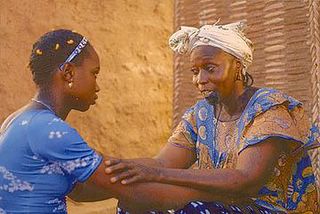
Moolaadé is the uplifting tale of African women who defy tradition and the mandates of their patriarchal tribe in ending the practice of female genital mutilation. The story begins with four girls escaping their “purification” ceremony and seeking asylum with Collé, a tribesman’s wife who refused to allow her daughter Amastou to be “cut.” Collé gives the girls shelter and casts a spell of protection, or Moolaadé, over them. When Ibrahima Doucuré, the wealthy heir and future leader of the village returns to marry Amastou, the elders decry Doucuré’s marrying a “Bilakoro” and demand that an excision be performed on Amastou and the other girls. Already having lost three of the six girls that fled their “purification,” the women band together, rise up against the village leaders, and successfully pronounce the end of the violent and often deadly practice.
This film artfully portrays women’s agency, and women’s ability to rise up and enact positive change, despite attempts to disenfranchise them. As those responsible for sustaining their households and families, Collé and the other women are empowered leaders of the community that won’t be “tamed.” They showed that it would take more than beatings and the confiscation of their radios to silence them; their minds were free, and as they proclaimed, “how do you lock up something invisible?” I found their use of the radio as a tool of their resistance noteworthy, especially in the context of globalization. Usually western influence is viewed as something inherently detrimental to indigenous peoples. The film presented an often approached ethical dilemma—is it right to disrupt cultures whose traditions prescribe human rights violations? Happily, Moolaadé offered these questions, as well as hope, in that change can come from within.

No comments:
Post a Comment